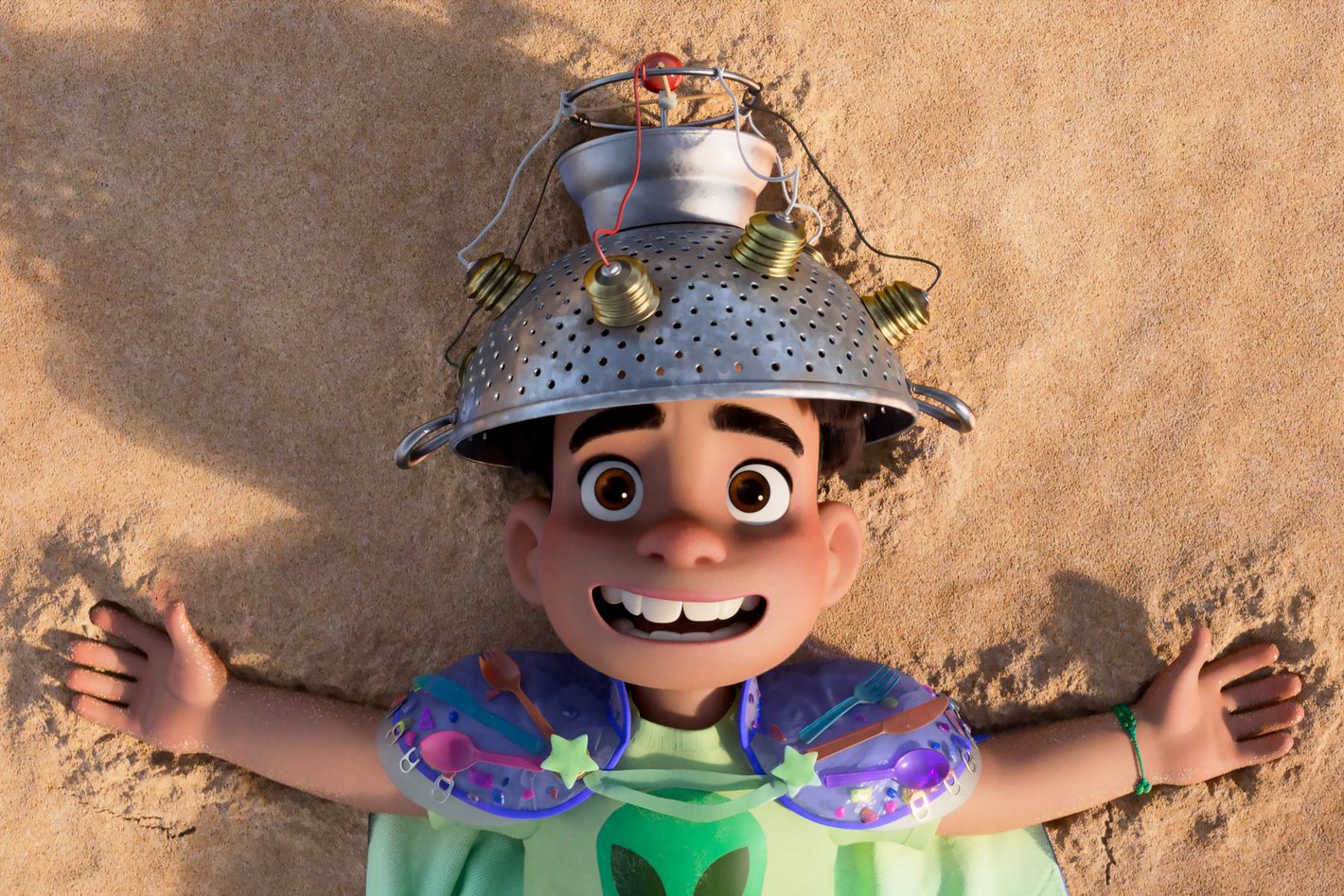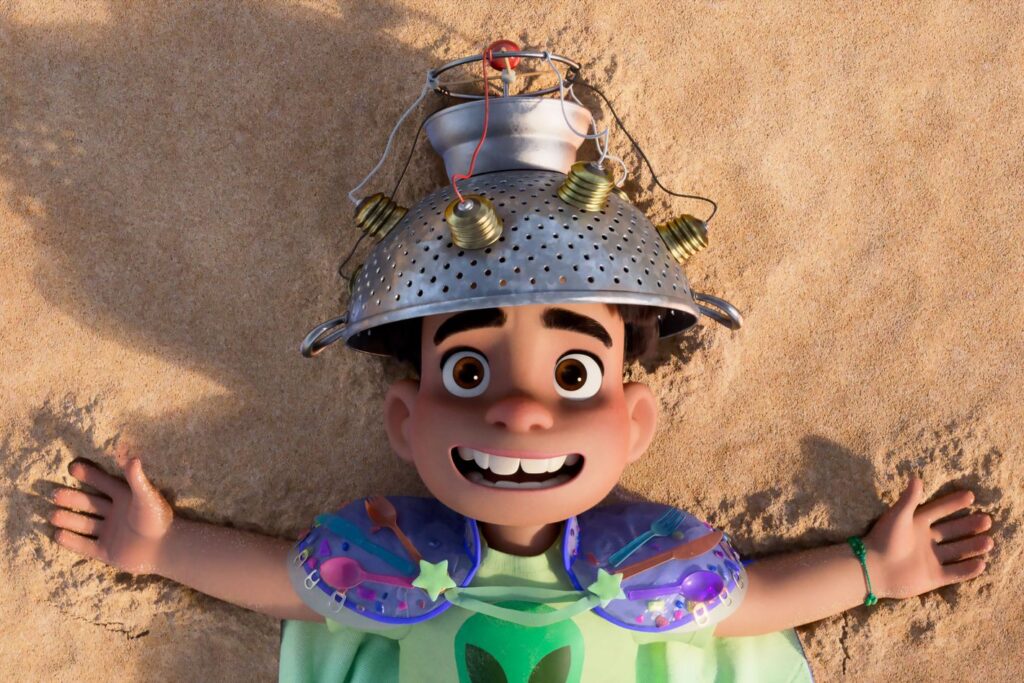
Elio is about an orphaned kid who dreams about escaping from his lonely life into space only to succeed in actually getting whisked away by aliens who are under the mistaken impression that he’s the leader of Earth and can make the case for his planet to join their confederation. By the standards of Pixar, the animation studio that brought us the adventures of a widowed septuagenarian and a Boy Scout in a balloon-lofted house and a romance between two robots on a blighted, postapocalyptic Earth, this premise isn’t especially outlandish. And the film has its pleasures, chief among them an adorable young alien named Glordon (Remy Edgerly), whom the title character befriends during his attempts to secure a place for himself as a Communiverse ambassador, and who’s possessed of a tardigrade-shaped body and sweet nature that confounds his warlord father. But Elio, which itself began as the baby of Coco writer Adrian Molina, only to then be ceded to directors Domee Shi and Madeline Sharafian, plays like something that was imperfectly assembled from its component parts, as though its creative team couldn’t figure out a way to align its visions of candy-colored intergalactic diplomacy with its emotional themes of empathy and learning to think about what’s going on inside those around us.
It’s an original concept from a studio that used to be a lot more invested in them than in sequels, and you can feel the pressure on everyone involved to recapture magic that eludes them. My personal theory is that Pixar has given itself the yips when it comes to making movies for boys. That never used to be an issue for the studio, whose heyday is filled with titles that don’t feel especially gendered in their intended audience, but that did revolve around characters — Woody, Buzz, Sulley, Mike, Marlin, Nemo, Remy, Lightning McQueen — that were male. Still, a few years ago, as though to counter a mild drift in focus toward young women in the Inside Outs, Turning Red, and Elemental, Pixar churned out Toy Story spinoff Lightyear, a space saga that felt explicitly and awkwardly reverse-engineered to reach a specific demographic the company apparently fretted it was losing. Watching Elio, you can feel the same tugs of calculation and overthinking in the way it lays out its premise of disaffection and otherworldly dreaming. The irony is that it’s Elio himself who becomes the movie’s biggest sticking point. It tries to find pathos in him but can’t entirely figure him out.
Elio Solis, voiced by Yonas Kibreab, has been living with his aunt, Olga (Zoe Saldaña), since the death of his parents a few years earlier. The grief of this loss has left him unengaged with his new life, resentful of Olga for her busy military career surveilling orbital debris, and uninterested in making friends. Instead, he spends his days on the beach begging extraterrestrials to abduct him. In order to care for him, Olga set aside her desire to become an astronaut, a dream Elio sees as proof that she doesn’t actually want him around. Pixar has never hesitated to show childhood tumult before, or to explore the feelings that might lead someone to act out, but Elio’s combination of mourning and self-pity are a genuine challenge. He’s so committed to the idea that he belongs on another planet that he dismisses the people who pass through his actual life, from the aunt he lightly torments to the boy he uses for his ham radio. Elio’s uglier side isn’t the issue so much as the film’s inability to fully flesh out the alienation he’s feeling before shipping him off to, you know, an alien nation. Olga, while frustrated and out of her depth, is clearly trying — we’re never in any doubt that Elio is wanted. What the film struggles with is illustrating how he ended up so convinced that life on Earth has nothing to offer him.
Instead, it crafts an interplanetary display to affirm his fantasies of escape — the Communiverse, a multispecies conference filled with cute aliens ranging from a telepathic flatworm (Jameela Jamil) to a rock-looking guy (Matthias Schweighöfer), who’ve united their civilizations in pacifist, high-tech harmony. Elio, which was written by Julia Cho, Mark Hammer, and Mike Jones, begins and ends with audio from Carl Sagan, but its interest in the idea of not being alone in the universe extends only as deep as a metaphor about getting vulnerable with other people. There’s real potential in the idea of an unhappy kid becoming the representative of the whole human race and having to make the case for what we’d bring to an advanced sci-fi association, but Elio touches on none of that. Instead, it sends its main character off to negotiate with the aggressive Lord Grigon (Brad Garrett, giving Emperor Zurg vibes), who stalks around in mechanical armor and is inclined to go to war with the Communiverse if his civilization isn’t allowed to join it. This romp will eventually get us to Glordon, with all his delightfully plump, merchandise-friendly physicality, and to an understanding that ruthless warlords and single aunts both have softer sides. But it also turns the entirety of first contact with alien worlds as a means of affirmation for one 11-year-old boy — not a huge step for mankind, but an elaborate way of giving Elio the choice to stay with Olga or to party in space forever. For a movie about someone learning, in both literal and emotional ways, that he’s not alone in the universe, Elio has real trouble getting out of its own head.
Pixar’s latest is a movie about learning we’re not alone in the universe that nevertheless has trouble opening up its main character.

































































